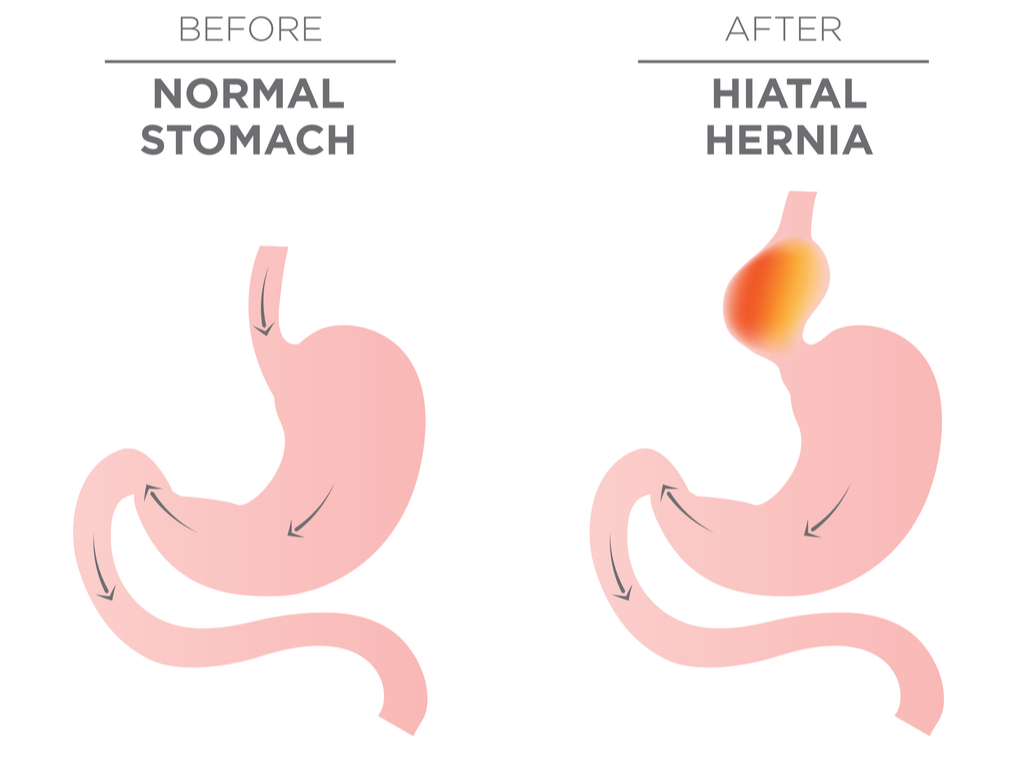What is a hiatal hernia?
What is a hiatal hernia?
A hiatal hernia happens when the upper part of your stomach bulges through a hole in your diaphragm.
The diaphragm is a large muscle that naturally has a hole, or opening, so the esophagus can connect to the stomach. This opening, known as a hiatus, enables food to pass through the upper part of your digestive system.
When the muscle tissue becomes weak, it can allow the stomach to bulge through the hiatus and form a hernia. With a hiatal hernia, acid can pool into the bulging pouch and cause irritation, like acid reflux.
What causes a hiatal hernia?
Determining the exact reason for a hiatal hernia is challenging. However, experts believe that weak muscles and pressure in the abdomen may contribute to its development.
Additional causes may be:
- Changes to the diaphragm due to aging
- Abdominal injury from surgery or trauma
- Continual intense pressure on abdominal muscles and surrounding area, like from coughing, vomiting, exercising, or heavy lifting
Those who are at higher risk of developing hiatal hernias are those:
- 50 or older
- overweight, or obese
Can my hernia be causing my reflux?
While acid reflux is a symptom linked to multiple medical conditions, one of the main causes is gastroesophageal reflux disease (GERD). This disease is caused by a malfunction of the lower esophageal sphincter muscle that separates the stomach from the esophagus and protects your throat from a backwash of stomach acid.
There are several risk factors and causes for GERD, but one specific problem is when a hernia forms in the diaphragm and a part of the stomach gets trapped in the hole. A hiatus hernia or hiatal hernia can increase instances of acid reflux symptoms.
This type of hernia occurs when the stomach is pulled up into the chest, which is higher than its usual position.
As the stomach gets trapped into a higher position, it becomes easier for stomach acid to flow back up into the esophagus and cause acid reflux.

What are the symptoms of a hiatal hernia?
Typically, most people who develop this type of hernia don’t present any symptoms. This is because most instances of hiatuses are either small or medium. When a hernia gets bigger, it can make undigested food and stomach acids flow back into your esophagus.
In this case, patients can present several different GERD symptoms, including:
- Heartburn
- Chest pain
- Abdominal pain
- Shortness of breath
- Vomiting blood
- Bloody stools
- Difficulty swallowing
- Frequent burping
- Bitter taste in the mouth
- Sore throat
- Fatigue
How bad is a medium-size hiatal hernia?
Typically, a medium-sized hernia will not cause pain. In fact, hiatal hernia problems typically only present in hernias larger than 6 cm or 2.5 inches. So, as long as your hernia is smaller than 6 cm or 2.5 inches, it should be manageable with self-care and medication.
Detecting a Hiatal Hernia

Many underlying conditions can cause acid reflux or GERD. Only a doctor can determine if a hiatal hernia is causing your acid reflux. Let your doctor know about your reflux symptoms that don’t improve after lifestyle changes and taking antacids.
To detect and diagnose a hernia, doctors perform a series of tests to assess the existence, size and severity of the hernia. These tests involve:
Barium dye or barium swallow x-rays
One of the main diagnostic tests used to detect a hernia, patients will swallow a barium shake before undergoing an x-ray. The barium mixture reacts well to x-ray exposure, allowing a doctor to better examine and diagnose internal problems.
Endoscopy Inspection
Using a robotic instrument called an endoscope, a doctor will inspect your esophagus and stomach to determine if you have a hernia. An endoscopic inspection can be performed through the mouth or a minimally invasive incision.
An endoscope is a flexible wand with a small light and camera at the end that captures and records the internal structure of your upper digestive system to determine the extent of your condition.
Esophageal Manotromy
This test is used to determine the functionality of your lower esophageal valve (LES). A herniated stomach will have no problem passing food or liquids into the stomach. However, the hernia will also allow stomach acid to reflux into the esophagus.
During the test, patients are not put under anesthesia but are given a local anesthetic inside and around the nose to prepare for the next step. After being numbed, a 4 mm catheter is inserted through the nose and passed down the esophagus and into the stomach.
The catheter then measures the pressure and movement of your muscles and the LES. The catheter used during this procedure has sensors placed regularly down its length, which allows for the measurement of the coordination of your esophagus. This test is especially effective at identifying swallowing problems.
pH acid analysis
This test is a 24-hour test that involves placing a catheter through the nose and throat and into the stomach. Once the device is placed, patients will continue with their typical daily routines and eating habits. Before the test, patients should work with their doctors to stop taking acid-inhibiting medications such as omeprazole to get an accurate measurement of the acid in the esophagus.
Can you feel a hiatal hernia with your fingers?
Some users of online internet forums have reported being able to feel a slight bulge under their sternum when seeking treatment for a hiatal hernia. However, this method is not as accurate at identifying the existence of a hernia.
What is the best treatment for hernias?
Your doctor will tailor the level of treatment based on the development of the hernia and your health concerns. As stated, you can treat small to medium-sized hernias with self care and medications. Typically, prescribed or over-the-counter medications will inhibit the production of stomach acid. This way, the stomach acid has a lower risk of flowing back up the throat and causing heartburn.
Lifestyle changes to treat acid reflux and hiatal hernias include:
- eating small meals throughout the day
- losing weight if you are overweight
- avoiding certain foods
Foods to avoid include:
- tomatoes
- citrus
- high-fat and fried foods
- chocolate
- caffeine
- alcohol
Hiatal Hernia Surgery or Acid Reflux Surgery
If changes in diet, lifestyle, and medications do not alleviate symptoms, you may need hiatal hernia surgery. Candidates for surgery are those who may experience severe heartburn, severe esophageal inflammation, or pneumonia from stomach acids.
At the Surgical Clinic, our board-certified general surgeons are experienced in several techniques of hiatal hernia repair surgery.
Transoral Incisionless Fundoplication (TIF)
In plain English, this procedure repairs and reconstructs the LES by inserting a special laparoscopic tool through the mouth and down the esophagus. This procedure leaves no scar tissue in the stomach and no external scars.
LINX®
The innovative LINX device uses magnetic implements to strengthen and reinforce the LES. One of our surgeons will place this device around your esophagus. Once placed, the LINX device will allow food to pass through the esophagus while also preventing reflux.
NISSEN Fundoplication

A minimally invasive laparoscopic surgery that can be used to treat symptoms of GERD as well as Hiatal hernias. Sometimes called Lap Nissen, this surgery effectively wraps a portion of the upper region of the stomach (the fundus) around the bottom of the esophagus to prevent reflux.
This surgery also serves as a permanent cure to the symptoms caused by a hiatal hernia.
Which is better, open surgery or laparoscopic surgery?
The question goes back to the condition of the patient and their needs going into surgery. Patients who are in good health and have common and routine procedural needs usually benefit the most from laparoscopic surgery.
Because laparoscopic surgery is minimally invasive, patients often experience shorter recovery times and can get back to their everyday lives much sooner than open surgery. However, minimally invasive surgeries usually require the use of a general anesthetic for a longer duration, so if a patient does not respond well to sustained anesthesia, open surgery may be more beneficial.
Is the surgery to repair a hiatal hernia worth it?
If you find out that you have developed a hiatus hernia, yet are not presenting symptoms, surgery may not be worth it yet. On the other hand, if you experience frequent and highly irritating acid reflux symptoms, it could be time to talk to your doctor about receiving surgery.
What Is The Best Diet for a Hiatal Hernia?
The best way to deal with acid reflux symptoms caused by a hiatal hernia is to reduce the portion sizes of your meals. Remember that symptoms of reflux intensify when the stomach becomes too full, which forces acid up into the esophagus.
Furthermore, you should limit or reduce how often you eat foods that trigger heartburn or acid reflux symptoms. This includes avoiding foods like chocolate, fried foods, high-fat foods, spicy foods, alcohol, dairy, and citrus fruits that are high in acid.
Causes and Risk Factors for Hiatal Hernias
Age and obesity are the two most common risk factors for developing a hiatus hernia. As for causes, the stress placed on the diaphragm or surrounding muscles can increase the risk of developing a hernia.
Can a hiatal hernia be caused by lifting heavy objects?
Yes. Additionally, intense coughing, straining bowel movements, heavy vomiting and even exercise can cause stress that widens the hiatus and increases the risk of developing a hernia.
How is a hiatal hernia treated by a physician?
The only way to fully repair a hernia is through surgery. However, if your symptoms are manageable and not very severe, your doctor can prescribe medications to reduce and inhibit stomach acid production in order to relieve symptoms.
Your doctor can also either diagnose or provide a referral to a specialist to help you determine if surgery is the right option for you.
It is vital to receive treatment for GERD. Without treatment, chronic acid reflux can cause:
- esophagitis
- esophageal stricture
- Barrett’s esophagus
- esophageal cancer
- hoarseness
- tooth enamel damage
Schedule a Consultation
If you have a hiatal hernia and need treatment, contact The Surgical Clinic to schedule a consultation with one of our expert general surgeons in Nashville, TN, or available throughout Middle Tennessee.
Nashville General Surgeons at The Surgical Clinic
Suhail Allos, MD
General Surgeon
John A. Boskind, MD, FACS
General Surgeon
Patrick T. Davis, MD, FACS
General & Bariatric Surgeon
Brent A. Fruin, MD
General Surgeon
Andrew W. Garrett, MD
General Surgeon
Bassam Helou, MD
General Surgery
Mark S. Hinson, MD, FACS
General Surgeon
George B. Lynch, MD, FACS
General & Bariatric Surgeon
Clinton A. Marlar, MD
General Surgeon
James G. McDowell, MD, FACS
General & Bariatric Surgeon
Willie V. Melvin III, MD, FACS
General & Robotic Surgeon
Chad M. Moss, MD, FACS
General Surgeon
Drew H. Reynolds, MD
General Surgeon
Joshua T. Taylor, MD, FACS
General & Robotic Surgeon
K. Tyson Thomas, MD, FACS
General Surgeon
J. Tyler Watson, MD
General & Robotic Surgery

